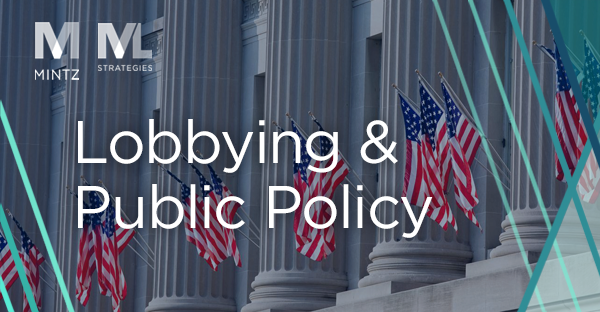
COVID-19 Viewpoints
Filter by:
IRS Issues Guidance for CARES Act Employee Retention Credit
April 3, 2020 | Alert
Read about recently issued IRS guidance related to the employee retention credit enacted in the Coronavirus Aid, Relief and Economic Security (“CARES”) Act.
Read more
ML Strategies COVID-19 Insights Week In Review — April 3, 2020
April 3, 2020 | Article
As the coronavirus pandemic spreads across the nation, your team at ML Strategies continues to monitor legislative and regulatory updates at the federal and state level. Each week, ML Strategies will provide weekly updates from Massachusetts and Washington, DC to keep you informed and aware of relief opportunities and guidance for your businesses and companies. If you have any questions, please don’t hesitate to reach out to ML Strategies professionals who are closely monitoring developments as they happen.
Read more
What You Need to Know: State and Federal Updates Related to COVID-19
April 3, 2020 | Blog | By R. Neal Martin, Taylor Shepherd
As the coronavirus pandemic spreads across the nation, your team at ML Strategies continues to monitor legislative and regulatory updates at the federal and state level. Each week, ML Strategies will provide weekly updates from Massachusetts and Washington, DC to keep you informed and aware of relief opportunities and guidance for your businesses and companies.
Read more
Barriers to Telehealth Continue to Fall After CARES Act and Other Federal and State Actions
April 3, 2020 | Blog | By Ellen Janos
As we’ve previously discussed on the blog, telehealth is playing a critical role in delivering care during the COVID-19 pandemic. Both Congress and states continue to take action to expand the use and reimbursement of telehealth services. The Coronavirus Aid, Relief, and Economic Security Act (CARES Act) passed by Congress last Friday includes many provisions that further expand the use and reimbursement of telehealth during this public health emergency. Congress previously took action to start waiving certain telehealth requirements in the Coronavirus Preparedness and Response Supplemental Appropriations Act (Appropriations Act) passed on March 6, 2020, which we previously discussed here. In this post, we’ll cover the key ways that the CARES Act continues to remove barriers to telehealth, in addition to other recent federal and state actions.
Read more
Governor Baker Extends and Modifies Order Closing All Non-Essential Massachusetts Businesses: Updates that Office Landlords Should Know
April 3, 2020 | Blog | By Chelsea Wood-Brown, Jennifer Kiely, Kelly Frey
On March 23, 2020, Governor Charlie Baker of Massachusetts issued COVID-19 Order No. 13 requiring all businesses and organizations in the Commonwealth of Massachusetts that do not provide “COVID-19 Essential Services” (“Essential Services”) to close their physical workplaces and facilities to workers, customers and the public as of 12:00 noon on Tuesday, March 24, 2020 until 12:00 noon on April 7, 2020. On March 31, 2020, Governor Baker issued a related order, COVID-19 Order No. 21 (the “Order”) extending the operation of its previous order to May 4, 2020 and updating the list of Essential Services based on federal guidance.
Read more
FCC Adopts Two Telehealth Programs Offering $300 Million to Support Health Care Providers
April 3, 2020 | Alert | By Russell Fox, Angela Kung
Read about the FCC’s order to adopt two telehealth programs offering $300 million to support health care providers, the COVID-19 Telehealth Program and the Connected Care Pilot Program.
Read more
COVID-19 Considerations: Midyear Reductions or Suspensions of Employer & Matching Contributions to 401(k) and Defined Contribution Plans
April 3, 2020 | Blog
Beyond COVID-19’s devastating impact on public health is its second order effects on the U.S. and world economy. Businesses of all sizes need to trim costs. An obvious place to start is with contributions to 401(k) and other tax-qualified retirement plans. This post reviews the options for cost cutting available to employers under their defined contribution 401(k) and profit sharing plans.
Read more
Small Business Chapter 11 Eligibility Expanded Under CARES Act
April 2, 2020 | Blog
President Trump signed the Small Business Reorganization Act of 2019 (the “SBRA”) into law in August of last year and it became effective on February 20, 2020. The SBRA amended the U.S. Bankruptcy Code and is designed to simplify and shorten the reorganization process for “small businesses” and to make the entire process more cost effective.
Read more
Five Suggested Updates for 340B Covered Entities Facing COVID-19 Challenges
April 2, 2020 | Blog | By Daryl Berke
The Health Resources and Services Administration (HRSA) recently published guidance regarding the evolving impact of COVID-19 on 340B stakeholders. This new guidance is one part of the U.S. Department of Health and Human Services’ broader effort to maximize regulatory flexibility for health care providers scrambling to meet patient needs during the COVID-19 crisis. While HRSA’s new guidance begins by acknowledging “it is appropriate to take into account the realities of the COVID-19,” HRSA offers little in the way of substantive relief when it comes to 340B. Long on generalities and short on specifics, HRSA merely advises entities to ensure they “have policies and procedures in place to address the proper dispensing of 340B drugs.”
Read more
M&A in the COVID Era – Part I – Dealing with Distress: Strategies for Buyers of Distressed Targets in the Post–COVID-19 Era
April 2, 2020 | Advisory | By William Kannel, Matthew T. Simpson
Read about the pros and cons for private company buyers seeking to purchase distressed targets through a formal bankruptcy process in the post–COVID-19 era plus strategies for success.
Read more
Ninth Circuit Joins Several Others in Finding that Lack of Medical Necessity Claims Can Proceed Under the False Claims Act
April 2, 2020 | Blog | By Samantha Kingsbury
The Ninth Circuit Court of Appeals recently allowed a False Claims Act (FCA) case based on an alleged lack of medical necessity to proceed, rejecting the lower court's decision that subjective medical opinions about the necessity of hospitalization cannot be "objectively false." The Ninth Circuit joins several other circuits (including the Third Circuit, which recently issued the Druding decision that we posted about a few weeks ago) in reaching this decision, which has been a rapidly evolving area of FCA law.
Read more
Zoom Lessons Learned: Vendor Privacy and Security Risks during COVID-19
April 2, 2020 | Blog | By Cynthia Larose, Christopher Buontempo
The COVID-19 pandemic and resulting office shutdowns has required many organizations to quickly transition to remote working environments. Going remote often requires a number of technology solutions and tools such as video conferencing, email, cloud file storage, file sharing, chat and communication platforms, and remote desktop applications, just to name a few.
Read more
Reduced Operations at U.S. Passport Agencies in Response to COVID-19; Processing Delays Expected
April 2, 2020 | Blog | By Colleen DiNicola
U.S. citizens have several ways to obtain or renew a US passport, and under certain conditions, the process can be completed in as little as 24 hours. However, in response to the COVID-19 pandemic, the U.S. State Department has significantly reduced operations at Regional Passport Agencies and Acceptance Facilities.
Read more
The CARES Act: A Summary Overview of Federal Tax Changes Affecting Businesses
April 1, 2020 | Alert | By David Salamon
This alert provides an overview of how the CARES Act, signed on March 27, 2020, eases tax burdens on businesses to increase their short-term liquidity as they deal with impacts of the COVID-19 pandemic.
Read more
Massachusetts: Corporate Board of Directors and Shareholders Meetings Changes as a Result of COVID-19
April 1, 2020 | Blog | By Daniel Connelly, Steven Baddour, Caitlin Beresin, Kaitlyn Sprague, Taylor Shepherd
This week, Governor Charlie Baker issued COVID-19 Order No. 19, “Order Regarding the Conduct of Shareholder Meetings by Public Companies. This Order, which is effective immediately, suspends certain requirements of M.G.L. chapter 156D, section 7.08 that relate to shareholder meetings by remote means.
Read more
CMS Releases Several Stark Law Waivers for Use during the COVID-19 National Emergency
April 1, 2020 | Blog | By Theresa Carnegie, Rachel Yount
On March 30, 2020, the Centers for Medicare & Medicaid Services (CMS) issued blanket waivers to the Stark Law that permit certain arrangements between physicians and health care providers implemented in response to COVID-19 that would otherwise violate the Stark Law. The waivers, which are numerous and fairly broad, offer health care entities significant flexibility to combat COVID-19 in ways that may have otherwise violated the Stark Law, such as the ability to pay physicians hazard pay and provide personal protective equipment to physicians at a price that is below fair market value (FMV). Importantly, the waivers only apply to remuneration and referrals related to COVID-19 purposes.
Read more
FCC Chairman Proposes Plan to Implement CARES Act Funding for Telehealth Program
March 31, 2020 | Blog | By Jane Haviland, Ellen Janos
On Monday, FCC Chairman Ajit Pai circulated a plan to his fellow Commissioners detailing how the $200 million the agency will receive via the CARES Act should be deployed for a telehealth program to combat COVID-19. The telehealth program will enable eligible healthcare providers to purchase telecommunications, broadband connectivity and information services, and devices necessary to provide telehealth services to beneficiaries. The increased access to the tools needed to provide care via telehealth will allow COVID-19 patients to receive care and providers to give it, while reducing opportunities for further exposure.
Read more
BREAKING NEWS: Governor Baker Extends Non-Essential Business Closures until Monday, May 4th
March 31, 2020 | Blog | By Steven Baddour, Daniel Connelly, Caitlin Beresin, Kaitlyn Sprague, Taylor Shepherd
Governor Charlie Baker just announced he is extending his executive order that mandates the closure of non-essential businesses.
Read more
FCC Initiates Plans to Provide $300 Million to Support Telehealth Services During COVID-19 Pandemic and Beyond
March 31, 2020 | Alert | By Russell Fox, Angela Kung
Read about the FCC’s plans to provide $200M for health care providers and patients during the COVID-19 pandemic and up to $100M to study telehealth services.
Read more
The Coronavirus Aid, Relief, and Economic Security Act: Assistance Available to Passenger Airlines and Airports
March 31, 2020 | Blog | By Tim McKeon, William Kannel
On March 27, 2020, President Trump signed into law the “Coronavirus Aid, Relief, and Economic Security Act” (the “CARES Act”), a $2+ trillion stimulus package intended to ease the economic and social disruptions facing the country in the wake of the COVID-19 outbreak.
Read more









